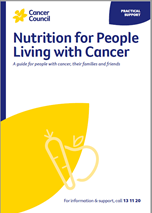- Home
- About Cancer
- Living well
- Complementary therapies
- The role of exercise and nutrition
The role of exercise and nutrition
It’s common for people with cancer to have questions about what to eat and whether to exercise during and after treatment. The right diet and exercise for you depends on the cancer type, the treatments you are having, your general health and your doctor’s advice. Learn how exercise and a balanced diet can help you look after your physical and emotional wellbeing.
Learn more about:
- Who can help with nutrition and physical activity
- How exercise and a balanced diet can help
- Other muscle and movement therapies
- Should I change what I eat?
- Taking care with special diets during treatment
Who can help with nutrition and physical activity?
Your GP and treatment team can provide general advice, but the following experts can also help.
| Exercise physiologist | An accredited exercise physiologist (AEP) has completed at least a 4-year university degree. They use exercise as medicine to help with chronic disease management and overall wellbeing. |
| Physiotherapist | This allied health professional has completed at least a 4-year university degree. They focus on physical rehabilitation and prevention and treatment of injuries using a variety of techniques, including exercise, massage and joint manipulation. |
| Dietitian | An accredited practising dietitian (APD) has completed a 4-year university degree in science, nutrition and dietetics. They modify diets to help treat disease symptoms and to get the most out of food. |
| Nutritionist | This term refers to both qualified nutrition scientists and naturopathic nutritionists. Some dietitians also call themselves nutritionists. Nutritionists working in the natural health industry should have at least a diploma of nutrition, or equivalent, from a university or naturopathic college. For nutrition advice specific to cancer, speak to an accredited practising dietitian. |
→ READ MORE: How exercise and a balanced diet can help
Podcast: Appetite Loss and Nausea
Listen to more episodes from our podcast for people affected by cancer
Video: Eating well after a cancer diagnosis
Video: Exercise and cancer
More resources
Dr David Joske, Clinical Haematologist, Sir Charles Gairdner Hospital and PathWest, Chairman and Founder Solaris Cancer Care Foundation, Clinical Professor of Medicine, The University of Western Australia, WA; Australasian Integrative Medicine Association (AIMA); Dr Robert Blum, Clinical Director, Cancer Services, Bendigo Health, NSW; Sally Brooks, Senior Pharmacist, Medicines Information, Peter MacCallum Cancer Centre, VIC; Dr Suzanne Grant, Senior Research Fellow, NICM Health Research Institute, Western Sydney University, and Chris O’Brien Lifehouse, NSW; Prof Danforn Lim, Adjunct Professor and Advisory Board Member, NICM Health Research Institute, Western Sydney University, and Adjunct Professor, UTS, NSW; Christina Line, Statewide Services Senior Coordinator, Cancer Council WA; Jen McKenzie, Physiotherapist (Lymphoedema) and ESSA Accredited Exercise Physiologist, The McKenzie Clinic, QLD; Simone Noelker, Wellness Centre and Pastoral Care Manager, Ballarat Regional Integrated Cancer Centre, VIC; Dr Nirzari Pandit, General Practitioner, RACGP Specific Interests Integrative Medicine Group, NSW; Georgie Pearson, Consumer; Cris Pirone, Counsellor, Cancer Council SA; Dr Elysia Thornton-Benko, Specialist General Practitioner, and UNSW Research Fellow, NSW; Kirsty Trebilcock, 13 11 20 Consultant, Cancer Council SA.
View the Cancer Council NSW editorial policy.
View all publications or call 13 11 20 for free printed copies.

